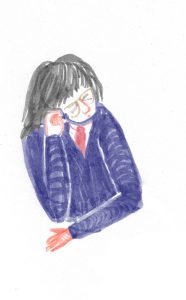
The student mindset has an unhealthy attitude toward sleep deprivation
By Caroline Ho, Assistant Editor
Most of us have at some point probably pulled an all-nighter or something close to it while finishing an essay or cramming for a final. Surviving on insufficient amounts of sleep and overcompensating with caffeine is virtually part of the authentic campus experience—but we really need to stop normalizing and glorifying it as such.
I’m not going to belabour this point, but there’s a wealth of scientific research showing that a lack of sleep is super unhealthy. Aside from short-term effects on your immune system, memory, mood, weight gain, and more, scientists have found that chronic sleep deficit can exacerbate the risk of Alzheimer’s, dementia, cardiovascular disease, and a whole host of other very serious physical and mental health conditions. However, a 2017 StatsCan study showed that about a third of Canadian adults are sleeping less than the recommended seven hours a night, and among teens the numbers are even worse. Suffice to say not getting enough sleep is objectively harmful and alarmingly common.
Yet why do so many people seem to persist in turning their sleep deprivation into a contest? I think plenty of us are cognizant of the negative health effects but continue to accept and even be proud of their consistent sleep deficit.
You’ve probably encountered your share of people bragging about how they’ve only had ten hours of sleep over the past three days thanks to a pile-up of projects or whatever else; I think a lot of us have participated ourselves in this boast-fest. Students in particular seem to think of sleep deprivation as a way to prove who’s the most hardworking and hardcore, who most deeply values their grades over their basic necessities. We seem to perceive this as some challenge, pitting our academic willpower against that trivial, easily conquerable inconvenience of the needs of mortals.
I acknowledge that many people do boast about their lack of sleep self-deprecatingly or ironically. Most of the Facebook posts I’ve seen have a lamenting tone of “Ha-ha, look at how little sleep I’ve had, fifth energy drink of the night, uh-oh.” I’m not saying that joking about legitimate physical and/or mental health concerns can’t be a valid way of dealing with them. Nor do I necessarily object to complaining; we all need to vent sometimes about being tired and overworked. However, most complaints I see or hear just sound like humblebrags, meant to impress others with demonstrations of internal fortitude. By acknowledging that a habit is unhealthy and sticking to it anyway, it feels like you’re trying to show that you’re really dedicated.
I believe that plenty of people who do talk or post about not getting enough sleep don’t necessarily see it as humblebragging. They’re expressing genuine tiredness and a genuine desire for more sleep. However, I wager that beneath the I-need-sleep sentiment there’s at least a little bit of misdirected pride.
Plus, if there is anything humblebragging is good for, it’s inciting one-upmanship. As long as we hold onto this skewed perception that lack of sleep is some kind of accomplishment, someone’s going to boast about being more modestly sleep-deprived, thus perpetuating the idea that it’s something to be proud of.
Admittedly, some people really can function on less sleep than others. According to Harvard Medical School’s Division of Sleep Medicine, there is quite a large variation between individuals in the amount of sleep required—between about six and nine hours—which is largely genetically determined. This discrepancy is all the more reason to stop viewing lack of sleep as a contest. If you are one of those individuals who only need six hours a night, congrats, I guess you can be proud of genetic factors entirely outside of your control if you really want. If you’re not, then don’t try to fight nature; it won’t inherently prove that you’re a better, more dedicated student.
I think our entire student ethos has a troubled relationship with sleep. Not that I think this problem is at all endemic to college campuses—I blame everything on a broader capitalist framework that has indoctrinated us into valuing productivity above all else… but that’s a rant for another time.


